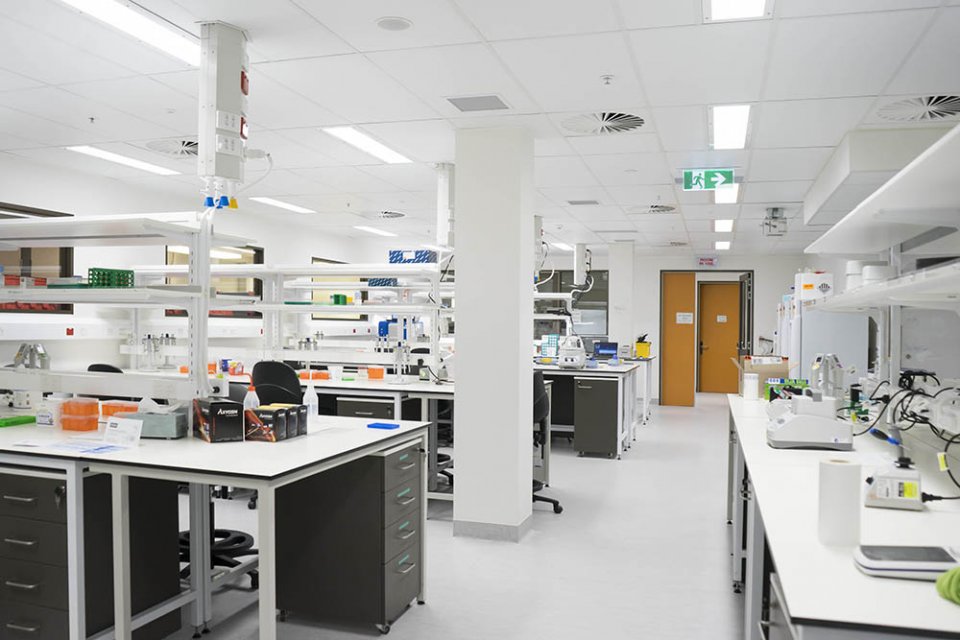Facilitated RNA Sequencing and associated BioInformatics course
Registration is now open for the EcoGenomics and BioInformatics Lab (EBL) and Biomolecular Resources Facility (BRF) Facilitated RNA Sequencing and
Speakers
Content navigation
RegisterDescription

Registration is now open for the EcoGenomics and BioInformatics Lab (EBL) and Biomolecular Resources Facility (BRF) Facilitated RNA Sequencing and associated BioInformatics course.
Registrations will close 18th February, 2019.
There’s more detail below, but briefly, the course will involve a (optional) wet lab component with participants bringing their own high-quality RNA “ready to go”, followed by a dry lab component with a focus on differential gene expression analysis. An optional module for de novo transcriptome assembly for non-model species will be included. The course will be best suited to participants who have a project underway with either RNA ready to prepare for sequencing or RNAseq data already generated.
Schedule
- 18-21 March: Wet lab RNAseq library prep. Led by Maxim Nekrasov, BRF, ANU.
- 1-12 April: Differential gene expression analysis, with first several days assembling de novo transcriptomes as required. Led by Marcin Adamski, RSB, ANU.
Although the course will take place over four weeks, there will be significant “down-time” for participants to work on unrelated tasks. Participants do not need to be “on-site” during the down time, though there are facilities here for anyone who wishes to be, especially out-of-towners.
We will endeavour to tailor the course as much as possible around participants’ requirements so please complete registration with as much info as possible around your specific project, samples, and aims. We will contact you to discuss your individual requirements. Then if it doesn't suit you, you can withdraw. Once you've committed and we've purchased reagents on your behalf, there'll be a binding commitment.
If you have any questions, please get in touch. We can discuss your requirements before a final commitment.
Full course detail
Wet lab library prep and RNA quality
Participants are expected to have reasonable level of molecular lab competence, i.e. pipetting, master mixes, purifications etc. No prior specific library prep skills are necessary.
Between 100ng and 1ug of RNA with a RIN of 8 or higher is required for the library prep. Of course, libraries can be done with any RNA, but lower RINs or quantities will compromise library success. Info on RNA quality/ quantity will be required beforehand.
Sample size is limited, with 8 samples considered sensibly manageable in one batch. So, if your project is large in number, this course might suit as a pilot study prior to a more significant financial outlay. There may be some flexibility around sample throughput, happy to discuss further...
Sequencing
Approximately 20 million reads/ sequence tags is best for differential expression analysis. 75bp single end reads is generally sufficient. A higher number of reads may be required if high sensitivity is needed for low expression genes and potentially fewer for a general overview and focus on genes of high expression and large changes between conditions.
60-100 million reads, preferably 150bp paired end is required for de novo transcriptome assembly. If samples are sufficiently limited in diversity, i.e. from the same species, same population or even better same genotype, then they can be pooled to achieve this, e.g. 8 samples @ 20 mil reads each = 160 mil reads total.
Cost
There will be a cost associated with the course to cover RNA-seq reagents and sequencing. We will personalise the final cost upon discussion with you, ie. taking in to account sample number, your particular read number requirements etc. To give an indication, library prep (Illumina TruSeq Stranded mRNA library prep) will be approx. $150 per sample. The EBL will subsidise by covering all additional incidental reagents and consumables.
Sequencing for straight forward differential expression analysis is likely to be approx. $2400, while for de novo transcriptome assembly, approx. $3000. Sequencing cost will vary depending on your own requirements and we can discuss once you’ve registered. In addition, once registrations are complete, it’s possible we may be able to pool projects in to larger sequencing batches to keep cost a bit lower.
Dry lab / bioinformatics analysis
The dry lab component will focus on differential expression analysis. While we do not plan to thoroughly address alternative splicing / isoform resolution, there may be some potential for superficial investigation.
Participants would require reasonable level of computer skills, i.e. it’s not really be suitable for inexperienced novices in genomic analysis.
Participants are required to provide their own laptop, sufficiently adequate for the task. As a rule of thumb less than 3 years old ideally quad core. Can discuss on individual basis.
The first few days (starting 1 April) will involve de novo transcriptome analysis for those requiring it (i.e. no reference genome available). Those with a ref genome do not need to attend, though are welcome to.
Dry-lab-only participants will be required to submit FastQC report beforehand. If the data you’re bringing with you is very large, it may require sub-sampling for the purposes of the workshop.
This dry lab component of the course will contain significant “down time” for participants to work on unrelated tasks. Note that participants will not need to be “on-site” during these times.
Location
Research School of Biology, ANU, Canberra
